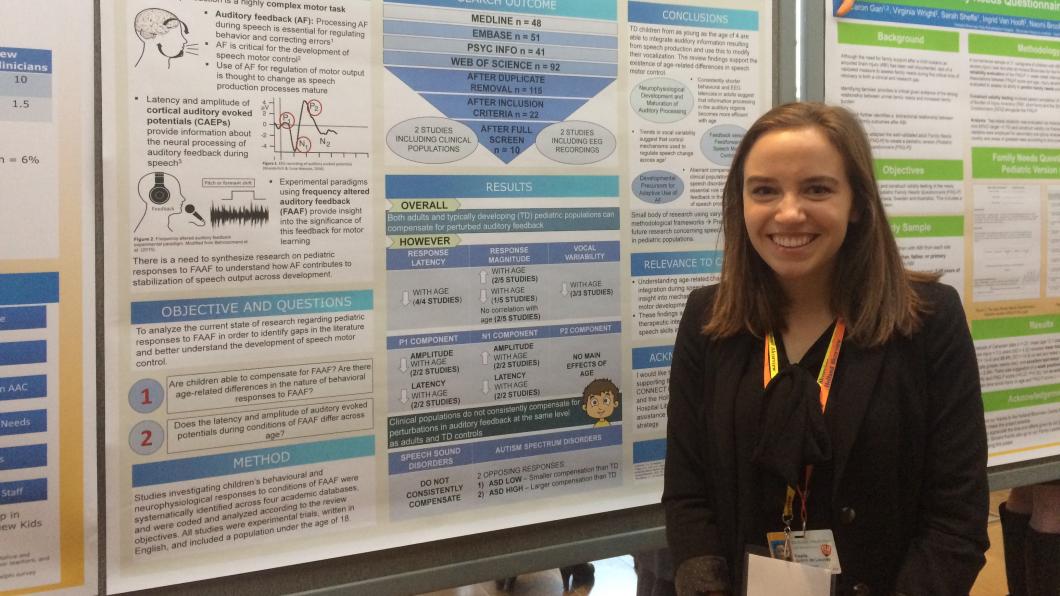
On November 22, 2016, the Bloorview Research Institute (BRI) held its 11th annual symposium themed ‘real life, real impact: research that changes lives’. The symposium brought together scientists, clients, trainees, and family leaders, among others, to share the current research projects that are taking place at Holland Bloorview. The symposium was a new experience for a few trainees who were presenting at the BRI symposium for the first time. Among these trainees were Keelia Quinn de Launay (1st year MSc student supervised by Dr. Deryk Beal in the CONNECT lab) and Sam Shi (2nd year MHSc student supervised by Dr. Jan Andrysek in the PROPEL lab). Below, Keelia and Sam shed some light on the real impact the BRI symposium had on them, and the trainee community as a whole.
Was this your first time presenting at a research symposium?
Keelia: In the final year of my undergrad degree I had the opportunity to present my thesis poster at a few conferences, and I also had the chance to present a poster at last summer's BRI Ward Summer Student Research Day. However, this was my first time presenting at the BRI Symposium.
Sam: I have done poster presentations at other conferences before, but this was my first time presenting a poster at the BRI symposium.
What excited you most about presenting at the BRI symposium?
Keelia: It was exciting to be surrounded by all the diverse, innovative research projects being conducted at the BRI. I really enjoyed being able to share my research with fellow trainees, as well as scientists, family leaders, and stakeholders from community organizations. Although presenting is always a bit nerve-racking, everyone approached the poster presentations with genuine interest and curiosity. I was able to learn a lot from the questions people asked me and the insight they provided into the potential implications of my research.
Sam: I was excited for the diverse audience I would have a chance to interact with. Different from engineering-themed conferences I previously presented at, the audience at the BRI symposium comes from diverse backgrounds including OTs, PTs, SLPs, psychologists, kinesiologists and engineers. A poster presentation is especially great for making connections with an audience, as it allows meaningful one-on-one conversations on a mutually interested research topic.
What research did you present at the BRI symposium?
Keelia: I presented the research project I completed this past summer as a Ward Summer Student, which was a scoping review of children's responses to altered auditory feedback.
Sam: I presented my master’s thesis project. The project works towards a training tool for individuals with lower-limb amputations to improve balance and reduce falls.
Were you involved in the BRI Symposium in any other element?
Keelia: No, I was only involved in the poster presentations. Luckily I had the chance to sit in and listen to all the presentations.
Sam: I volunteered to work at the registration desk in the morning, and assisted the BRI operation team in many other duties. Although I missed a small part of the presentations due to this, I was glad to greet the attendees and help organize an impeccable event.
What was your favorite part of the BRI symposium?
Keelia: I really enjoyed the Lived Experiences keynote. I was able to learn so much about the family experience of participating in research, which is essential for us as trainees to understand as we are collaborating with families throughout our project development. Further, it was so important to hear about what the families think should be prioritized in research.
Sam: My favourite part of the symposium was the QuickHits. I really liked that the speakers were very energetic in their speeches, and the session moved at a fast pace. Every single one of the talks was so inspiring to listening to. You never got bored of them, and craved for more once they ended. QuickHits was a great format to showcase the diverse research pursuits at the BRI. And it was pleasant to see contributions from many of my fellow trainees.
Why is it important for trainees to attend the BRI Symposium?
Keelia: I think that the symposium is so important for trainees because it gives us an opportunity to learn about topics in disability and rehabilitation that differ from our own projects and therefore can expand our knowledge and challenge our perspectives. This in turn can make us think of new ways to approach our own research. Also, learning about the impact research from the BRI has had on families and the community is motivating, and inspires me as a trainee to contribute to this research and knowledge.
Sam: The symposium is important, as it reminds ourselves about the impacts our research brings to clients and families at Holland Bloorview and beyond. Too often we devote much time on the depth and details of our research projects, and lose the big picture. Celebration of research outcomes is an important part of research to keep us motivated. Also, getting involved in the symposium is a great way to enjoy the unique trainee experience BRI has to offer. The research here at Holland Bloorview is unlike anywhere else. It is so multidisciplinary, collaborative, client and family-centred. The scientists and trainees are among the best and brightest in the city. As BRI trainees, we are so fortunate to train in such an awesome environment.